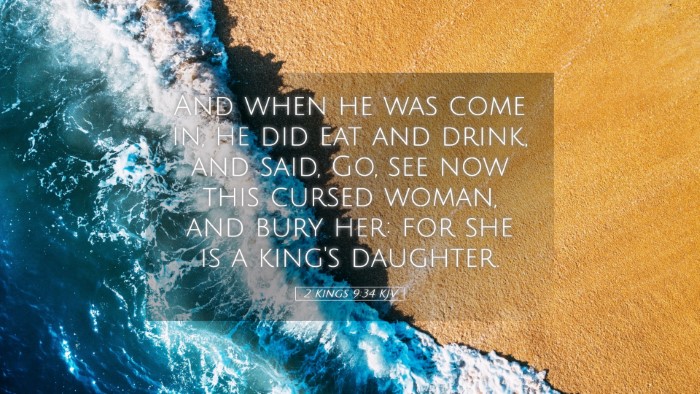Commentary on 2 Kings 9:34
Bible Verse: "And when he was come in, he did eat and drink, and said, Go, see now this cursed woman, and bury her: for she is a king's daughter."
Introduction
The fascinating narrative of 2 Kings 9:34 captures a pivotal moment in the tumultuous history of Israel's monarchy. This verse encapsulates the complex character of Jehu, the king anointed by God to execute divine judgment upon the house of Ahab. In this commentary, we will draw insights from public domain commentaries to explore the theological, historical, and moral dimensions of this passage.
The Character of Jehu
Jehu's character is a focal point in the events surrounding this verse. As noted by Matthew Henry, Jehu comes into power after a decisive and violent coup against Queen Jezebel and Ahab's descendants. His actions must be understood in the context of his divine mission: to eradicate the worship of Baal and bring judgment on the corrupt dynasty of Ahab.
Motivation and Actions: Jehu's command to bury Jezebel, despite her notorious reputation, reflects a complex balance between reverence for royal dignity and the disdain he holds for her idolatry. Albert Barnes remarks that this moment illustrates Jehu's duality; he does not forget Jezebel's princess status, suggesting that to dishonor her body would go against the customs of monarchy.
Theological Implications
This passage raises important theological questions about justice, mercy, and the nature of divine judgment. The Lord had given Jehu a mandate (see 2 Kings 9:7-10) to wipe out the house of Ahab, which had led Israel into sin through idolatry and immorality. Adam Clarke provides insight into the mercy that is interspersed with divine judgment, highlighting that the burial of Jezebel is a sign of the greater respect due to those of royal lineage, even in their disgrace.
The Role of Burial
The act of burial in the ancient Near East was of significant cultural and religious importance. Henry points out that proper burial was believed to be essential for peace in the afterlife, and failing to bury the dead, especially a king's daughter, would be considered a grave insult. Thus, Jehu’s instruction to bury Jezebel should not be perceived merely as an act of compliance with customs, but as a recognition of the potential for divine grace even after severe judgment.
Jezebel's Legacy and Symbolism
Jezebel represents the epitome of idolatry and wickedness in the biblical narrative. Her legacy is a warning against the enticements of power and the dangers of leading others away from faithful worship. Barnes conveys that Jezebel's death is a fulfillment of prophetic word and serves as a solemn reminder of God’s sovereignty over kingdoms and the ultimate accountability to divine standards.
Moral Reflections
Pastors and theologians can draw moral lessons from the interactions between Jehu and Jezebel as recorded in this passage. Clarke suggests that even in circumstances of judgment, there is the potential for honor and respect towards God’s creations. The juxtaposition of Jehu’s violent rise to power against this gesture of burial serves as a reflection on the paradox of justice where human actions often contain elements of both grave sin and noble intent.
Lessons on Leadership
- Divine Calling: Leaders must be aware of their divine calling, understanding that they are held accountable for their actions.
- Respect for Legacy: While one may need to confront and address evil, it is important to remember that every individual has a legacy that deserves respect in some form.
- Judgment tempered with Mercy: Reflect on the balance between justice and mercy in leadership; the consequences of sin do not negate our moral obligations to others.
Conclusion
The narrative surrounding 2 Kings 9:34 serves as a profound exploration of the complexities of divine judgment and human responsibility. Jehu’s actions towards Jezebel invite readers to reflect deeply on the themes of power, morality, and the reverberations of one’s legacy. Through this commentary, gleaned from the insights of Matthew Henry, Albert Barnes, and Adam Clarke, we are reminded that biblical narratives hold rich lessons for spiritual formation and ethical conduct amidst the reality of life’s moral dilemmas.


